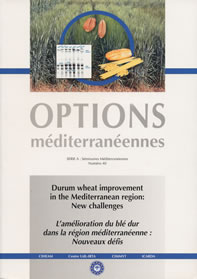| Article précédent | p. 363-371 | Article suivant |
Chromosomally engineered durum wheat: The potential of alien gene introgressions affecting disease resistance and quality
As a result of the application of tools from both molecular genetics and cytogenetics, wheat-alien gene introgression projects carried out by means of chromosome engineering approaches are now benefiting by a substantial gain in efficiency with respect to the past. We have recently exploited such tools in producing durum wheat recombinant lines carrying separately the Lr19 plus Yp genes from Agropyron elongatum, the Pm13 gene from Aegilops longissima and the Gli-D1 per Glu-D3 and Glu-D1 genes from common wheat. Fluorescence in situ hybridization (FISH), with total genomic DNA (GISH) of the alien donor or specific DNA sequences as probes, was mostly useful for isolation and characterization of desired products, i.e. lines containing alien chromosomal segments of sufficiently reduced size to be well tolerated in a tetraploid background. Preliminary field and quality tests indicated the validity of such recombinant lines as promising candidates for durum wheat genetic improvement and varietal development.
- [ Afficher ]
- [ Télécharger ]
- [ Exporter la citation ]
Vous pouvez télécharger la citation au format :
- [ Imprimer ]
-
Mots-clés
BLE, MARQUEUR GENETIQUE, RECOMBINAISON, SELECTIONCiter cet article
Ceoloni C., Forte P., Ciaffi M., Nenno M., Bitti A., De Vita P., D'Egidio M.G. Chromosomally engineered durum wheat: The potential of alien gene introgressions affecting disease resistance and quality. In : Royo C. (ed.), Nachit M. (ed.), Di Fonzo N. (ed.), Araus J.L. (ed.). Durum wheat improvement in the Mediterranean region: New challenges . Zaragoza : CIHEAM, 2000. p. 363-371. (Options Méditerranéennes : Série A. Séminaires Méditerranéens; n. 40). Seminar on Durum Wheat Improvement in the Mediterranean Region: New Challenges, 2000/04/12-14, Zaragoza (Spain). http://om.ciheam.org/om/pdf/a40/00600060.pdf



